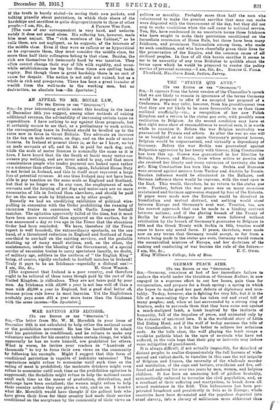THE "STATUS QUO ANTE."
(To THE EDITOR or THE " SPF.CTATOR."1
Sia,—It appears from the latest version of the Chancellor's speech that wo are likely to remain in ignorance of the terms Germany would be prepared to offer if we accepted her proposal of a Conference. We may infer, however, from his grandiloquent tone that they are not likely to be more favourable to us than those outlined unofficially—viz., a recognition of her new Polish Kingdom and a return to the status quo ante, with possibly some restitution to Belgium. As the second condition may have at first sight some show of reasonableness to neutral ears, it is worth while to examine it. Before the war Belgian neutrality was guaranteed by Prussia and others. As after the war no one will be so benighted as to trust again Germany's perjured honour, Belgium would be unguaranteed, and virtually a dependency of Germany. Before the war Serbia was guaranteed against Bulgarian aggression by her treaty with Greece; King Constantine has torn this up. Greece was guaranteed in her liberties by Britain, France, and Russia, from whose active or passive aid she received her liberty and every extension of territory she has got; King Constantine has torn this up. Serbia and Rumania were secured against menace from Turkey and Austria by Russia.. Russian influence would be eliminated in the Balkans, and German influence there would be supreme, with the road open is the East. This would, therefore, be no return to the status qua ante. Further, before the war peace was on many occasions maintained and German aggression stopped by fear of the Entente. If peace were made now the Entente would be dissolved in humiliation and mutual distrust, and nothing would stand between Europe and Germany's next war. Treaties, too, are the nearest approach that can be made to a binding contract between nations; and if the glaring breach of the Treaty of Berlin by Austria-Hungary in 1998 were followed without retribution by the breach of Germany's guarantee to Belgium in 1914 and the Greek Treaty with Serbia in 1915, treaties would cease to have any moral force. If peace, therefore, were made now on any terms that Germany would accept, so far from a return being made to the status quo ante, Germany would remain the uncontrolled mistress of Europe, and her doctrines of the making and conducting of war become the rule of the future.— I am. Sir, &c., E. C. Owns. King William's College, Isle of Man.


























 Previous page
Previous page